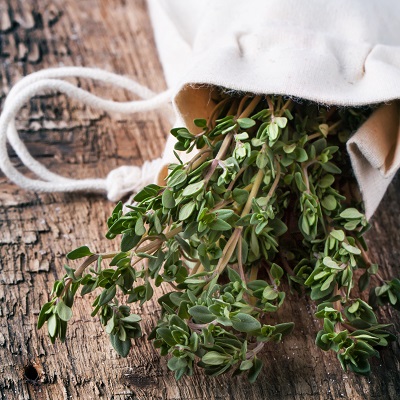 Herbs are often used as an after-thought when planning your diet, but there are many health-related reasons they should be front and center.
Herbs are often used as an after-thought when planning your diet, but there are many health-related reasons they should be front and center.
One of the most obvious is that they are big in flavor but very low or negligible in calories.
“Because they’re so flavorful, they make it easier to cut back on less healthy ingredients like salt, sugar, and added fat,” Adrienne Youdim, MD, an associate clinical professor of medicine at the UCLA David Geffen School of Medicine, ells WebMD.
If you’re on a calorie-restricted diet, herbs are a great, tasty way of adding a bit of oomph to your meals without adding extra calories.
Also, though herbs have few calories, they are hugely beneficial from a nutritional standpoint, according to the American Academy of Nutrition and Dietetics.
The Mayo Clinic agrees, saying that herbs are good sources of phytochemicals, which are natural disease-fighting compounds like antioxidants and anti-inflammatories. Others help with cell clean-up or blood cell clumping.
According to the Academy, herbs have been found to help lower blood pressure and help control cholesterol levels.
However, the Mayo Clinic cautions about using herbal supplements or remedies. You should always check with your doctor before taking them because they could interact with prescribed medicines, leading to potentially dangerous or even life-threatening side-effects.
Youdim says it’s always best to eat the real thing rather than in a capsule form. There are few regulations governing the supplement market. And a capsule may not contain what it says on the box. There are few downsides to eating fresh herbs.
If you’re new to cooking with herbs, you might want to try a pinch at a time. However, even a small amount can be beneficial to your health.
We’ve compiled a list of our favorite health-giving herbs:
- Rosemary is packed full of antioxidants that can prevent cell damage says WebMD. Even a whiff of it has proven to help aid memory. This might be thanks to one of its compounds called 1.8-cineole, which is thought to boost brain activity.
- Though strictly speaking not an herb, fresh garlic contains a powerful compound called allicin, which becomes effective only when the garlic glove is cut or crushed. WebMD says lab studies have shown that allicin may slow the growth of cancer cells and may help prevent heart disease. Eating garlic regularly may also help lower cholesterol and blood pressure.
- The American Association for Retired Persons (AARP) recommends growing peppermint as a remedy for indigestion. It apparently soothes the muscles of the digestive tract, alleviating intestinal gases and cramping. Sipping a peppermint brew when you have a cold, may thin mucus and phlegm and soothe a sore throat. Rub it on your mosquito bites to relieve the itch. It can also help to ease headaches and muscle cramps.
- Lemon balm has been endorsed by a panel of German health practitioners for relieving anxiety and restlessness and improving memory.
- Valerian root, according to the AARP, has been used throughout history as a sleep aid. The word valerian comes from the Latin valere, which means, “to be in good health.” Studies have shown that it helps people drop off to sleep quicker and improves the quality of your sleep.
- Sage, according to a Swiss study, can be effective in relieving a sore throat. It also has been shown to keep your breath fresh because of its anti-bacterial properties.
Herbs are some of the healthiest and lowest calorie foods you can eat and they add flavor without salt too! Therefore, whether you add them to your food or brew them as a tea, herbs are a welcome addition to anyone’s diet.






